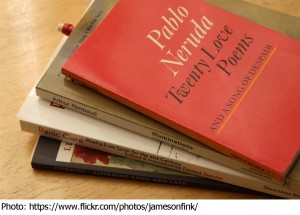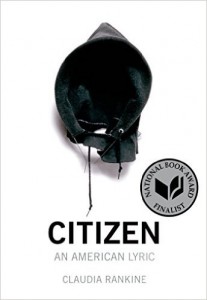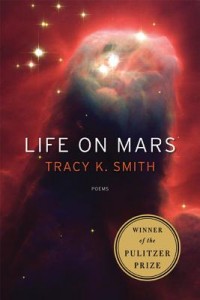 Contemporary poetry strays from traditional ideas of a poem: rigid structure, definitive rhyme scheme, commonly about nature or love. Poetry exemplifies and dissects certain internal states, tracing racial, political, and gendered themes of universality and solitude. At my university, I’m currently enrolled in a class dedicated to Contemporary American Poetry where we discuss the complexities of this genre. I’ve found studying poetry makes me a better writer. This comes from the emphasis on dissecting details, utilizing a larger context as reference, and reconciling metaphors with the reality which poetry embodies.
Contemporary poetry strays from traditional ideas of a poem: rigid structure, definitive rhyme scheme, commonly about nature or love. Poetry exemplifies and dissects certain internal states, tracing racial, political, and gendered themes of universality and solitude. At my university, I’m currently enrolled in a class dedicated to Contemporary American Poetry where we discuss the complexities of this genre. I’ve found studying poetry makes me a better writer. This comes from the emphasis on dissecting details, utilizing a larger context as reference, and reconciling metaphors with the reality which poetry embodies.
 Details: I understand poetry is not for everyone. It’s confusing, sometimes upsetting, and not everyone connects to it. Like any other form of writing, the participation of the reader is as important as the author’s. Poets and readers alike must make an effort to be conscious of the connections between words and their referents in reality. This sense of awareness also yields a better comprehension of the details in poetry. The most compelling part of poetry, in my experience, is the deep attention to detail. For example, Claudia Rankine uses her profound awareness of micro-aggressions to detail one moment’s “intended targets, all the meanings behind the retreating seconds.” Rankine develops in her poem these daily occurrences of oppression to turn the mundane into the profane. With every poem I read I am more astounded by the level of concentration to the details which she describes with such fervor. Noticing them in written works creates a distinctive awareness of including them in my own writing.
Details: I understand poetry is not for everyone. It’s confusing, sometimes upsetting, and not everyone connects to it. Like any other form of writing, the participation of the reader is as important as the author’s. Poets and readers alike must make an effort to be conscious of the connections between words and their referents in reality. This sense of awareness also yields a better comprehension of the details in poetry. The most compelling part of poetry, in my experience, is the deep attention to detail. For example, Claudia Rankine uses her profound awareness of micro-aggressions to detail one moment’s “intended targets, all the meanings behind the retreating seconds.” Rankine develops in her poem these daily occurrences of oppression to turn the mundane into the profane. With every poem I read I am more astounded by the level of concentration to the details which she describes with such fervor. Noticing them in written works creates a distinctive awareness of including them in my own writing.
 Context: Contemporary poetry is not always easy to understand. Sometimes it requires a larger context and asks the reader to learn more in order to understand the meaning behind certain phrases. Perhaps look up translations or gain an understanding of the social and political contexts surrounding the murders Tracy K. Smith addresses in her poem “In Which The Dead Send Postcards to Their Assailants from America’s Most Celebrated Landmarks” from her collection Life on Mars. Even looking up words that, in their poetic context, don’t particularly make full sense to me helped me attain a better sense of the poet’s work. It’s easier to craft levels of understanding when I have a better sense of how a reader might respond to foreign concepts or words I include in my writing.
Context: Contemporary poetry is not always easy to understand. Sometimes it requires a larger context and asks the reader to learn more in order to understand the meaning behind certain phrases. Perhaps look up translations or gain an understanding of the social and political contexts surrounding the murders Tracy K. Smith addresses in her poem “In Which The Dead Send Postcards to Their Assailants from America’s Most Celebrated Landmarks” from her collection Life on Mars. Even looking up words that, in their poetic context, don’t particularly make full sense to me helped me attain a better sense of the poet’s work. It’s easier to craft levels of understanding when I have a better sense of how a reader might respond to foreign concepts or words I include in my writing.
Metaphors: When reading poetry, I often find my interpretations are wrong. Whether studying poetry or simply reading for fun, it can be easy to connect with certain lines or passages and liken them to your experience. This is the gift of poetry: a connection between poet and reader. All humans have certain connotations connected to particular words or phrases that conjure specific personal memories unique from any other. Because of this, our perceptions of poetry, or any writing for that matter, are skewed. I’ve found that I can use this to my advantage when writing. These personal perceptions provide each individual with a unique sense of a poem, something that can be analyzed, discussed, and compared to other perspectives. Recognizing how readers bring their own set of associations to a metaphor, it makes me more careful in how I use them in my writing.
Reading poetry makes me conscious of the artful construction of words into meaning. Learning about poetry has made me a better writer. How has poetry influenced your writing?
